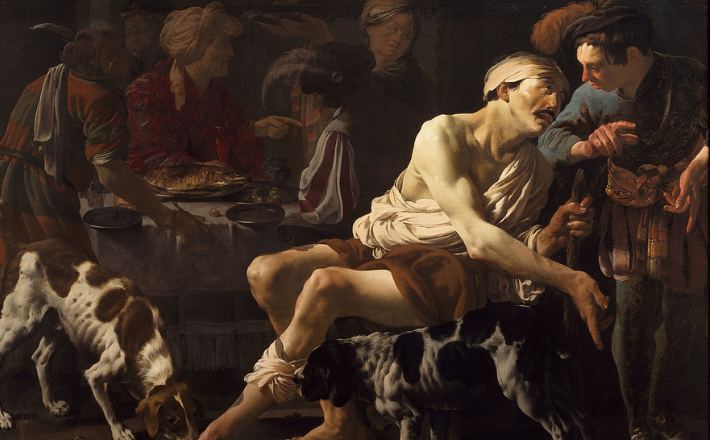Commentary on Luke 16:19-31
This parable lends itself to preaching the terrors, and maybe that’s warranted from time to time, depending on your context, with all the appropriate cautions. The message seems fairly simple if your hearers are rich: Do more for the poor or else you will suffer forever once you die, and so will your family members who don’t change their ways. If your hearers are Lazarus-poor, then no terrors are necessary. The message for them also seems clear: Things are terrible now, but after you die, you will be well cared for forever and will witness the rich people suffer.
These interpretations do respond to some of the basic dynamics of the disturbing story Jesus tells. But they leave some questions trailing behind them. Fear of pain as a motivation for repentance and reformation is a part of the biblical tradition, of course, though that tradition is one among others. The promise that the blessed will see enemies suffer is also a thread running through parts of the Bible, though it, too, benefits from the tempering of the broader argument in Scripture about how the faithful should view and treat opponents. But perhaps we can move beyond these basic discomforts and into the weeds.
It seems wrong to ask what the cutoff is for being counted among the rich—akin to that lawyer asking who his neighbor is—but when many (most?) of the people we preach to seem to be somewhere in between dressed in purple/feasting sumptuously every day and lying on the ground/starving/covered with sores, it seems important to know.
And perhaps the answer is: If you must ask, you already know. Compared to a Lazarus with absolutely nothing, we are all rich. And there are many with nothing in this world, of course. If not at our personal gates, then on the streets of our cities and at the gates of our nations. The parable implies—but does not directly say—that the rich man should have done something differently to avoid his fate; namely, he should have voluntarily suffered more during his life for the sake of Lazarus and, presumably, others in need. The exact nature of that sacrifice is not named, though the reference to Moses and prophets provides a framework. Like most parables, this one leaves plenty of room for imagining what a faithful response might look like.
Of course, one can also think of lots of allegorical ways to interpret the language of “rich” in this parable beyond (but without setting aside) material wealth: One can be rich in intellect, rich in talent, rich in friendship, rich in health, rich in beauty, rich in circumstance, even rich in the gifts of the Spirit. Read in this way, the parable invites us to consider not whether we are wealthy but what kind(s) of wealth we enjoy, and who the corresponding Lazari in our lives might be.
But even if your hearers are not Lazarus-poor, it is also vital to read the story with Lazurus center-stage. Indeed, keeping Lazarus central responds to the implication that the rich man saw Lazarus every day, but never saw him at all until it was too late. At the very least, we should see Lazarus when we preach his story.
We learn that Lazarus is injured and hungry and perhaps has difficulty walking. Commentators note that the reference to the dogs licking his sores is probably just a way of saying Lazurus has sunk as low as a person can go. But knowing dogs, I wonder if there is more to it. Those creatures may have been the closest thing to friends Lazurus knew—the hounds of heaven, curled at his side. How long Lazarus lived in this way, Jesus doesn’t tell us. Somehow he got enough to eat and drink to survive, barely. And then he dies, and angels bear him away to Abraham’s arms. Whatever that means, it’s good. Lazarus is “comforted” in ways far more satisfying than the rich man’s lifetime of purple and linen and charcuterie.
Notice: It is Lazarus, and not the rich man, who gets a name in the parable, though he has no voice. One way to interpret this is that Jesus, too, ignores Lazarus, depriving him of lines! But there’s another way to see it. Lazarus has no need to say anything about the little drama that unfolds between Abraham and the rich man in the afterlife. He’s spent enough time thinking about that rich fool, who even now seems to think Lazarus is available to run errands for him. Lazarus has better things to do. Though I can’t begin to imagine what they are, I have no doubt they are amazing. I hope those dogs are there too, as blissful as Lazarus himself, running through eternity, curled up at his side.
PRAYER OF THE DAY
Divine Word,
You sent Moses to speak law to the people and bring order to chaos. You sent prophets to speak repentance and bring hope to the hopeless. You sent your son, Jesus, to become your living Word. Open our ears to hear your word, and our hearts to reflect the light of your truth to others, for the sake of the Incarnate Word, Jesus Christ. Amen.
HYMNS
Lord, thee I love with all my heart ELW 750
Jesus, priceless treasure ELW 775, UMH 532, NCH 480
Jesus, all my gladness H82 701
CHORAL
God so loved the world, Robert Chilcott


March 30, 2025